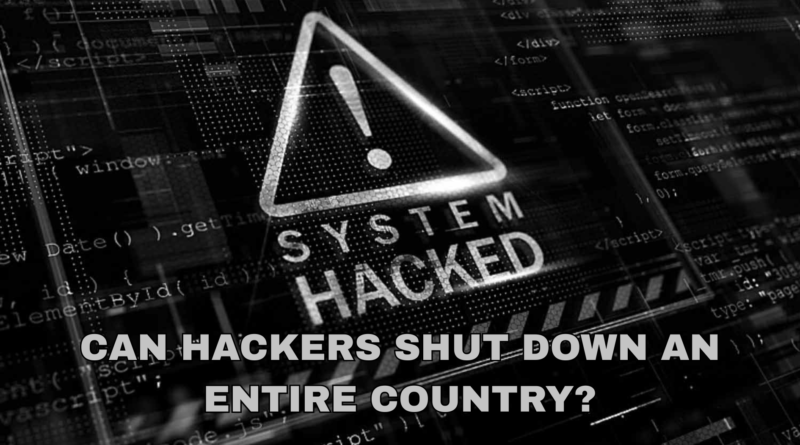CAN HACKERS SHUT DOWN AN ENTIRE COUNTRY?
In today’s digital age, almost everything in a country depends on technology. From banking and hospitals to electricity and water supply, computers and networks keep the system running. Because of this, a big question often comes up: Can hackers shut down an entire country? The idea sounds like something from a movie, but in reality, it is possible under certain conditions. Let’s explore how, why, and what could happen if such an event took place.
How Hackers Could Target a Country
Hackers are skilled people who know how to break into computer systems. Some do it for money, some for fun, and some for political or military reasons. When hackers attack a whole country, it is usually called a cyberwarfare or cyberattack.
There are several ways hackers could try to shut down a country:
Attacking Power Grids
Electricity is the backbone of modern life. Without it, factories stop, hospitals fail, and communication breaks down. If hackers get control of a country’s power grid, they can cause blackouts that paralyze entire cities.
Shutting Down Banks
Modern banking depends on digital systems. Hackers could freeze accounts, steal money, or block payments. If people cannot use ATMs, online banking, or credit cards, panic would spread quickly.
Crippling the Internet
The internet connects government offices, companies, and ordinary people. Hackers could use large-scale attacks, like DDoS attacks (flooding systems with fake traffic), to make websites and services go offline. Imagine if nobody in a country could use Google, WhatsApp, or even government websites.
Targeting Transportation
Airports, trains, and even traffic lights rely on computers. Hackers could delay flights, crash ticketing systems, or cause traffic jams by attacking these systems.
Disrupting Healthcare
Hospitals use digital records, connected machines, and even robots for surgery. A cyberattack could block doctors from accessing patient data or even shut down life-saving equipment.
Real-Life Examples
The idea of hackers shutting down a country is not just theory. It has already happened in smaller forms:
Estonia, 2007: The country faced massive cyberattacks that shut down banks, media, and government websites for weeks. This was one of the first examples of a cyberattack on a nation.
Ukraine, 2015: Hackers attacked the power grid, causing blackouts for thousands of people in the middle of winter.
Iran, 2010 (Stuxnet virus): Hackers used a computer virus to damage nuclear facilities. This showed that cyberattacks could destroy physical machines, not just software.
These incidents prove that hackers have the power to damage parts of a country. While no nation has been fully shut down yet, the risk is real.
Why It’s Difficult to Shut Down a Whole Country
While hackers can cause chaos, completely shutting down a country is very hard. Here’s why:
Strong Security Systems
Governments spend billions on cybersecurity. Military, banks, and power companies often have backup systems and expert teams working to stop hackers.
Decentralized Networks
In many countries, systems like power grids or internet services are spread out. Even if hackers attack one city, others may keep running.
Backup and Recovery
Most organizations keep backup data and emergency plans. If one system is hacked, they can often restore it quickly.
International Cooperation
Countries work together to track cybercriminals. If hackers try to launch a big attack, international agencies often get involved.
What Would Happen If Hackers Succeeded?
If hackers somehow managed to shut down a whole country, the results would be dramatic:
Economic Collapse: Banks and businesses would lose billions. Stock markets could crash.
Public Panic: Without access to money, food, or communication, people might panic and create chaos in streets.
Health Risks: Hospitals could fail to treat patients, leading to deaths.
National Security Threat: Military bases and defense systems could be exposed. This might invite attacks from enemy nations.
Global Impact: In today’s connected world, if one country shuts down, others would also feel the shock. Trade, travel, and communication across borders would be affected.
The Future of Cybersecurity
As technology grows, the threat of hackers also grows. Some experts believe that the next world war may not be fought with tanks and missiles, but with computers and code. Cybersecurity has become as important as physical security.
Governments are already preparing for this:
Training cyber armies to defend against digital attacks.
Building firewalls and AI tools that can detect hacking attempts.
Creating backup systems to keep the country running even during an attack.
Passing laws to punish cybercriminals and strengthen online safety.
Conclusion
So, can hackers shut down an entire country? The short answer is: Yes, it is possible, but very difficult. Hackers can damage important systems, cause blackouts, and disrupt daily life. However, shutting down a whole nation completely would require massive skill, resources, and planning.
The threat is real, and the world has already seen small examples of it. That’s why countries are investing heavily in cybersecurity. In the future, protecting data and networks will be as important as protecting borders.
In simple words: hackers have the power to cause chaos, but whether they can bring a whole country to its knees depends on how prepared that country is.




